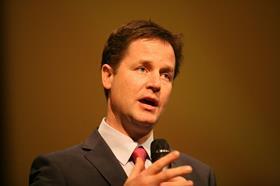Deputy prime minister admits that coalition cut too much from capital spending raising prospect of a boost in infrastructure investment

Nick Clegg has raised the prospect of a boost to infrastructure investment in the forthcoming Budget after conceding that the coalition government cut capital spending too deeply when it came to power.
The admission came as the latest Office for National Statistics figures showed the UK economy shrank by 0.3% in the final quarter of 2012, raising fears of a triple-dip recession. The figures showed construction output grew by 0.3% compared with the previous quarter, but fell 11% year-on-year.
In an interview with House magazine, the deputy prime minister conceded that the government cut capital spending too deeply when it came to power and said the coalition needed to boost public spending on infrastructure in a bid to drive the economic recovery.
He said: “Wherever we can we’ve got to mobilise more capital investment into productive capital because the economic evidence is overwhelming. It helps create jobs now, people go onto construction sites, it raises the productive capacity of the economy in the longer run.”
Quizzed on the comments, Clegg later told the BBC that he remained committed to the government’s deficit reduction strategy, but added that he wanted the government to be “restlessly creative about how, within those strictures, you do things to make the economy grow”.
Labour said Clegg’s comments were the first admission that the government had made “serious mistakes on the economy” and called on the coalition to change tack. It was a view that received the backing of the International Monetary Fund, with the fund’s chief economist Olivier Blanchard calling on the chancellor to “take stock and make adjustments” to the deficit reduction programme in the March Budget.
“We said that if things look bad at the beginning of 2013 – which they do – then there should be a reassessment of fiscal policy,” Blanchard said.
Noble Francis, economics director at the Construction Products Association, welcomed Clegg’s comments on boosting capital spending. “This is something the industry has been calling for, for two years. However, he must turn this sentiment into real activity if we are not to experience further decline across the industry and the wider economy for many months to come,” he said.
Francis said the GDP figures showed the final quarter of 2012 was “extremely difficult” for construction.
“Recent figures for new orders, which are a forward-looking indicator for the industry, were 7% lower than a year ago and as a consequence the coming year is likely to see further contraction from what is already a very difficult position,” he added.
‘Junk rhetoric of austerity’
Mayor of London Boris Johnson has called on the Treasury and the Bank of England to end the relentless focus on austerity and boost investment in new homes and infrastructure.
Speaking at the World Economic Forum in Davos, Switzerland, last Friday, hours after the release of figures showing the economy was contracting, Johnson said it was time to “junk the rhetoric of austerity” and instead take steps to boost confidence and spending.
Johnson said he supported chancellor George Osborne’s deficit-reduction strategy, but said savings could be made in some parts of government that could be spent elsewhere on capital projects that could boost growth.
He also attacked the downbeat rhetoric of the Treasury and the Bank of England, alluding to the painful age of austerity overseen by post-war Labour chancellor Stafford Cripps. “There is huge potential in the UK. It is important we have the spirit of confidence. Some of the mutterings from Threadneedle Street are not the stuff to give the troops,” he said.
“We need investment in housing and transport, things that make a big difference.
“The hair shirt, Stafford Cripps agenda is not the way to get Britain moving again.”





















.jpg)





No comments yet